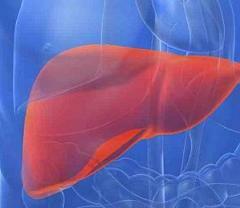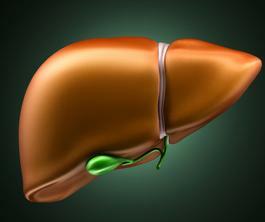 Chronic hepatitis is a clinical and morphological syndrome that is caused by various causes and is characterized by a certain degree of necrosis of hepatocytes and inflammation.
Chronic hepatitis is a clinical and morphological syndrome that is caused by various causes and is characterized by a certain degree of necrosis of hepatocytes and inflammation.
According to the International Classification of Diseases, the term "Chronic hepatitis" (HG) refers to such diffuse inflammatory liver diseases, in which clinico-laboratory and morphological changes persist for 6 months or more [2, 6, 8, 9].
The most widespread at present are viral hepatitis B and C. The hepatitis D virus, in turn, is not viable without a previous hepatitis B virus: it is their combination that determines the likelihood and severity of chronic hepatitis B infection.
What happens in the human body with hepatitis?
If the immune response is adequate, then the body will free itself from the pathogen, the virus goes away and the hepatitis recovered. This is the case with hepatitis A, E, in most cases with hepatitis B.
If the strength of the immune defense is not sufficient at the time when the primary infection develops, the virus remains in the liver (persistence). The disease goes into a chronic phase. This occurs with hepatitis C, less often with hepatitis B.
Causes of chronic viral hepatitis
Chronic hepatitis is etiologically associated with acute forms of viral hepatitis B, C, D, E, G, especially proceeding in a mild icteric, jaundiced or subclinical variant and assuming a protracted character.
Chronic viral hepatitis usually develops on the background of unfavorable factors - incorrect treatment of acute hepatitis, incomplete convalescence at the time of discharge, burdened premorbid background, alcoholic or narcotic intoxication, infection with other viruses (incl. hepatotropic), and so on.
The leading pathogenetic mechanism in chronic viral hepatitis is a disruption of the interaction of immune cells with virus-containing hepatocytes. At the same time there is a deficiency of the T-system, a depression of macrophages, a weakening of the interferonogenesis system, the absence of specific anti- antigens of viruses, which ultimately disturbs the adequate recognition and elimination of the antigen by the immune system of virus antigens on the surface of hepatocytes.
Varieties
Chronic viral hepatitis can cause hepatitis B, C, D.
- Hepatitis B virusThe most studied, it was opened in 1965. The virus is referred to the family of hepadnaviruses, it contains deoxyribonucleic acid (DNA), the molecule of which is constantly being completed with the help of the DNA polymerase enzyme. The hepatitis B virus has high resistance to high and low temperatures, chemical and physical effects.
- Hepatitis D virus, or "delta-agent", is an incomplete RNA-containing virus. It is attributed to defective viruses, since for its replication in the human body it is necessary to have a previous (superinfection) or co-infection with hepatitis B virus, which acts as an assistant virus. HBsAg, covering the viral particle, promotes the manifestation of hepatotrophy and cell capture of the hepatitis D virus.
- Hepatitis C viruswas singled out in 1989. It is an RNA-containing flavivirus coated with a lipid coat. An important feature of it is a genetic heterogeneity, resulting in a large number of different hepatotypes, subtypes, mutants. In clinical practice, 6 genotypes of the hepatitis C virus are distinguished: 1a, 1b, 2a, 2c, 3a and 4a.
The cause of chronic autoimmune hepatitis is not fully understood.
Symptoms
This disease is not characterized by specific symptoms, indicating which hepatitis virus is infected with the patient.
The most frequent symptoms of hepatitis are unmotivated weakness, deterioration of appetite, weight loss, nausea. Patients may feel a feeling of heaviness and dull pain in the right hypochondrium.
In some patients, the body temperature (up to 37 C) can be increased for a long time, jaundice of the sclera and skin, and itching of the skin appears. The enlargement of the liver is usually moderate, sometimes the size of the affected organ remains within normal limits for a long time.
Diagnostics
If suspected of hepatitis, patients are tested for hepatitis B and C markers that can cause chronic liver disease. This is a surface antigen of hepatitis B (HBsAg), an antibody to the core antigen of the hepatitis B virus (anti-HBc) and an antibody to the hepatitis C virus (anti-HCV).
Other markers are used to clarify the diagnosis, determine the indications for treatment, the prospects for curing the patient and should not be used in routine screening.
Treatment of chronic hepatitis
 When the main therapy is prescribed, the cause of the disease is taken into account. When viral hepatitis shows antiviral drugs, the scheme for treatment of hepatitis C involves the regular intake of ribavirin and intravenous injection of an interferon in the body.
When the main therapy is prescribed, the cause of the disease is taken into account. When viral hepatitis shows antiviral drugs, the scheme for treatment of hepatitis C involves the regular intake of ribavirin and intravenous injection of an interferon in the body.
One therapeutic course lasts from several weeks to several months, depending on the symptoms and stage of the disease.
Also, basic therapy for chronic viral hepatitis is used.
- Diet №5 (food 5-6 times a day, protein restriction to 30-40 g per day with the development of hepatic encephalopathy (severe disorders of the nervous system), exclusion from the diet of acute, fatty, fried, smoked food).
- Admission of vitamin (vitamin B, folic acid, ascorbic acid, lipoic acid) complexes courses lasting 1-2 months.
- Enzyme (digestive) drugs that do not contain bile.
- Limitation of intense physical and psychoemotional loads.
With negligent treatment and treatment, chronic hepatitis turns into cirrhosis, which is considered an incurable disease.
Chronic hepatitis c - how many live with it?
Age of infection is one of the proven factors affecting the rate of fibrosis development in hepatitis C. In a one-dimensional analysis it was found that liver cirrhosis develops within 20 years in only 2% of patients infected before the age of 20, 6% of infected at the age of 21 to 30, 10% infected in the age of 31 - 40, 37% infected in 41 - 50 years and 63% of those infected at the age of more than 50 years.
The prognosis for each of the patients suffering from hepatitis is strictly individual and its health depends on many factors:
- genotype of the virus;
- the amount of the virus during primary infection;
- duration of the disease;
- the extent of liver damage;
- the presence of concomitant diseases;
- the age of the patient;
- general health and immunity;
- Whether the person is engaged in sports, and from physical activities;
- reaction of the body to treatment.
In different people, chronic hepatitis C manifests itself in different ways: someone can experience painful sensations, and someone at the same time feels one hundred percent. That is why, answering the question, hepatitis c - how many live with it, it is impossible to name the exact figure.

How to choose probiotics for the intestine: a list of drugs.

Effective and inexpensive cough syrups for children and adults.

Modern non-steroidal anti-inflammatory drugs.

Review of tablets from the increased pressure of the new generation.
 Antiviral drugs are inexpensive and effective.
Antiviral drugs are inexpensive and effective.

